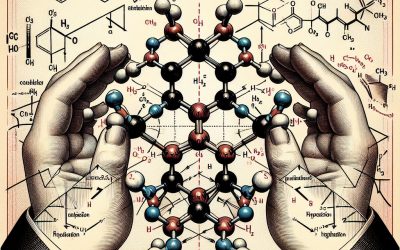🧪 Introduction to Chemistry
Unlocking the Secrets of Matter and Change
Chemistry is the science of matter—what it’s made of, how it behaves, and how it changes. It explores everything from the tiniest atoms and molecules to the vast chemical reactions that fuel stars, power engines, and sustain life itself. Often called the “central science,” chemistry connects physics with biology, medicine, geology, environmental science, and even engineering.
At its core, chemistry seeks to answer questions like:
-
What is this substance made of?
-
How does it interact with other substances?
-
Why do some materials burn, rust, or dissolve?
-
How can we create new materials, medicines, or fuels?
From the food we eat to the air we breathe, from cleaning products to smartphones, chemistry is everywhere. It helps explain natural phenomena like fire, digestion, and photosynthesis, while also driving innovations in technology, health, and sustainability.
By studying chemistry, we gain a deeper understanding of the world at a molecular level—and the tools to change it for the better.
The Benefits of Boron: How this Trace Element Can Boost Your Health
Boron is a chemical element that is essential for the growth and maintenance of the human body. It is a naturally occurring mineral that is found in the earth’s crust and can be found in various foods. Boron plays a crucial role in many physiological processes, including bone health, brain function, hormonal balance, inflammation reduction, heart health, immune system support, skin health, and cancer prevention. The importance of boron in the body cannot be overstated. It is involved in the metabolism of calcium, magnesium, and vitamin D, which are all essential for maintaining healthy bones. Boron also helps to regulate hormone levels, including testosterone and estrogen, which are important for reproductive health and overall well-being. Additionally, boron has anti-inflammatory properties that can help reduce pain and inflammation associated with conditions such as arthritis. It also supports heart health by reducing the risk of cardiovascular disease and boosts the immune system to fight off infections. The recommended daily intake of boron varies depending on age, sex, and overall health. The National Institutes of Health (NIH) recommends a daily intake of 1-13 mg of boron for adults. However, it is important to note that excessive intake of boron can be toxic and may cause adverse effects. Therefore, it is essential to consult with a healthcare professional before taking any boron supplements. Summary Boron is a trace mineral that is important for overall health and wellbeing. Boron plays a crucial role in bone health, helping to prevent osteoporosis. Boron may improve brain function and cognitive performance, as well as balance hormone levels. Boron has anti-inflammatory properties that may help relieve arthritis symptoms...
Unravelling the Intricacies of Stereochemistry: A Journey into the Fascinating World of Molecular Symmetry
Stereochemistry is a branch of chemistry that deals with the three-dimensional arrangement of atoms in molecules and the effect of this arrangement on the chemical and physical properties of compounds. It focuses on the study of molecular symmetry, which refers to the arrangement of atoms in space and the resulting symmetry or asymmetry of a molecule. The importance of molecular symmetry in stereochemistry cannot be overstated. The arrangement of atoms in a molecule determines its shape, which in turn affects its reactivity, biological activity, and physical properties. Understanding molecular symmetry is crucial for predicting how molecules will interact with each other and how they will behave in various chemical reactions. Summary Understanding molecular symmetry is crucial in stereochemistry. Stereochemistry plays a vital role in both chemistry and biology. Asymmetric molecules have chirality, which is important in stereochemistry. Enantiomers and diastereomers are types of stereoisomers. Stereochemistry is essential in drug design and development. The Importance of Stereochemistry in Chemistry and Biology Stereochemistry plays a vital role in both chemistry and biology. In chemistry, stereochemistry is essential for understanding the behavior of molecules in reactions and for designing new compounds with specific properties. For example, the stereochemistry of a drug molecule can determine its effectiveness and safety. In biology, stereochemistry is crucial for understanding the structure and function of biomolecules such as proteins and enzymes. One example of stereochemistry in chemistry is the concept of chirality. Chirality refers to the property of a molecule that cannot be superimposed on its mirror image. Chiral molecules have two non-superimposable mirror image forms called enantiomers. This property has significant implications in drug design...
Unleashing the Wonders of Beryllium: Exploring the Applications and Properties of Be
Beryllium is a chemical element with the symbol Be and atomic number 4. It is a rare and versatile element that has been used in various industries for centuries. The history of beryllium dates back to ancient times, with its discovery credited to the French chemist Louis-Nicolas Vauquelin in 1798. However, it was not until the late 19th century that beryllium began to be used commercially. Beryllium has a number of unique properties that make it highly valuable in various industries. It is a lightweight metal with a high melting point, excellent thermal conductivity, and exceptional strength-to-weight ratio. These properties make it ideal for use in aerospace, defence, nuclear technology, electronics, and medical applications. Summary Beryllium is a rare and versatile element with unique physical and chemical properties. Beryllium is used in high-performance applications in aerospace and defence, as well as in nuclear technology and medical applications. Beryllium is also used in electronics, such as computer components and mobile devices. Beryllium has potential in sustainable energy technologies, but its environmental impact must be carefully considered. The future of beryllium includes emerging applications and technologies, but challenges in mining and production must be addressed. The Physical and Chemical Properties of Beryllium: Understanding its Unique Characteristics Beryllium has an atomic structure that consists of four protons, four neutrons, and four electrons. It is a relatively small atom, with a radius of only 112 picometers. The electron configuration of beryllium is 1s2 2s2, which means it has two electrons in its inner shell and two electrons in its outer shell. Chemically, beryllium is a highly reactive element. It readily forms compounds...
Exploring the Fascinating World of Functional Groups in Organic Chemistry
Functional groups are specific groups of atoms within a molecule that determine its chemical properties and reactivity. They are responsible for the characteristic behavior of organic compounds and play a crucial role in organic chemistry. Functional groups are defined by the presence of certain atoms or combinations of atoms, such as carbon, hydrogen, oxygen, nitrogen, sulfur, and halogens. The importance of functional groups in organic chemistry cannot be overstated. They provide a way to classify and categorize organic compounds based on their chemical behavior and properties. By understanding the functional groups present in a compound, chemists can predict how it will react with other compounds and design new molecules with desired properties. Summary Functional groups are specific groups of atoms that determine the chemical properties of organic compounds. Understanding the role of functional groups is crucial in predicting and understanding chemical reactions. Common functional groups include alcohols, carbonyls, amines, thiols, and halogens. Alcohols are versatile functional groups that can undergo various reactions, including oxidation and dehydration. Carbonyl functional groups, such as ketones and aldehydes, are important in organic chemistry due to their reactivity and involvement in many biological processes. Understanding the Role of Functional Groups in Chemical Reactions Functional groups have a significant impact on chemical reactions. They determine the reactivity and behavior of organic compounds, influencing how they interact with other molecules. The presence of certain functional groups can make a compound more or less reactive, and can even dictate the type of reactions it can undergo. For example, alcohols contain the hydroxyl functional group (-OH), which makes them highly reactive. The hydroxyl group can undergo various reactions,...
The Power of Lithium: How This Element is Revolutionizing Energy Storage
Energy storage has become increasingly important in recent years due to the growing demand for reliable and sustainable energy sources. As renewable energy technologies such as solar and wind power continue to gain popularity, the need for efficient and cost-effective energy storage solutions has become more pressing. Energy storage plays a crucial role in enabling the integration of renewable energy into the grid, as it allows excess energy to be stored and used when needed. Summary Energy storage is crucial for the future of renewable energy. Lithium is a versatile and efficient element for energy storage. Lithium-ion batteries work by moving ions between electrodes. Lithium’s unique properties make it ideal for energy storage, including its high energy density and low weight. Lithium-ion batteries have a wide range of applications, from smartphones to electric cars. Lithium: The Wonder Element of Energy Storage Lithium is often referred to as the “wonder element” of energy storage due to its unique properties that make it an ideal choice for battery technology. It is the lightest metal and has a high electrochemical potential, which means it can store a large amount of energy in a small volume. Additionally, lithium is highly abundant in the earth’s crust, making it a readily available resource for battery production. The use of lithium in energy storage dates back to the 1970s when researchers first discovered its potential as a battery material. Since then, lithium-ion batteries have become the dominant technology for portable electronics such as smartphones and laptops. In recent years, they have also gained traction in the electric vehicle market and are now being explored for grid-scale...
Unleashing the Power of Quantum Chemistry: Exploring the Fascinating World of Molecular Science
Quantum chemistry is a branch of chemistry that focuses on the application of quantum mechanics to understand and predict the behavior of molecules and chemical reactions. It involves the use of mathematical models and computational methods to study the electronic structure and properties of atoms and molecules. Understanding the fundamentals of quantum chemistry is crucial for advancing our knowledge in various fields, including drug discovery, material science, and industry. Summary Quantum chemistry is the study of the behaviour of atoms and molecules using quantum mechanics. Molecular science involves the study of the properties and behaviour of molecules. Quantum mechanics revolutionised molecular science by providing a more accurate understanding of atomic and molecular behaviour. Quantum chemistry has numerous applications, including drug discovery, material science, and chemical manufacturing. The future of quantum chemistry is full of exciting possibilities and opportunities, but there are also challenges and limitations that must be addressed. The Fascinating World of Molecular Science Molecular science is the study of molecules, which are the building blocks of matter. It encompasses a wide range of disciplines, including chemistry, physics, biology, and materials science. By studying molecules, scientists can gain insights into their structure, properties, and interactions, which can then be applied to various fields. Studying molecules is important because they play a crucial role in many natural and synthetic processes. For example, understanding the structure and function of biological molecules such as proteins and DNA is essential for advancing our knowledge in biology and medicine. Similarly, studying the properties of materials at the molecular level can lead to the development of new materials with improved properties. The Emergence of...
Revolutionizing Healthcare and Manufacturing: The Impact of Applications in Medicine and Industry
Technology has become an integral part of our lives, transforming various industries and revolutionizing the way we live and work. Two sectors that have seen significant advancements due to technology are healthcare and manufacturing. The integration of applications and software has brought about a multitude of benefits, improving patient care, enhancing manufacturing processes, and increasing efficiency. In this article, we will explore the role of technology in these industries, focusing on advancements in medical imaging and diagnostics, robotics and automation in manufacturing, the importance of data analytics, personalized medicine, the evolution of 3D printing, cybersecurity, and the future opportunities and challenges in healthcare and manufacturing. Summary Applications are revolutionizing healthcare and manufacturing industries. Technology plays a crucial role in the healthcare industry. Advancements in medical imaging and diagnostics are improving patient outcomes. Robotics and automation are transforming the manufacturing industry. Data analytics is essential for improving healthcare and manufacturing processes. The Role of Technology in the Healthcare Industry Technology plays a crucial role in improving patient care and enhancing healthcare services. With the help of applications and software, healthcare professionals can streamline their processes, reduce errors, and provide better treatment options for patients. Electronic Health Records (EHRs) have become a standard practice in healthcare facilities, allowing doctors to access patient information quickly and efficiently. This not only saves time but also improves accuracy in diagnosis and treatment. Another significant advancement in healthcare technology is telemedicine. Telemedicine allows patients to consult with doctors remotely through video calls or online platforms. This is particularly beneficial for patients who live in remote areas or have limited access to healthcare facilities. Telemedicine has...
Unravelling the Mystery: Understanding Reaction Mechanisms in Chemical Reactions
Chemistry is the study of matter and the changes it undergoes. At the heart of chemistry lies the understanding of chemical reactions and their mechanisms. A reaction mechanism is a step-by-step sequence of elementary reactions that leads to the overall transformation of reactants into products. Understanding reaction mechanisms is crucial in various fields, including pharmaceuticals, materials science, and environmental science. In pharmaceuticals, for example, understanding reaction mechanisms is essential for drug discovery and development. By knowing how a drug interacts with its target molecule, scientists can design more effective and selective drugs. In materials science, understanding reaction mechanisms is important for synthesizing new materials with desired properties. And in environmental science, understanding reaction mechanisms helps in predicting and mitigating the impact of chemical reactions on the environment. Summary Understanding reaction mechanisms is crucial for predicting and controlling chemical reactions. Chemical reactions involve the breaking and forming of chemical bonds, and reaction mechanisms describe the steps involved in this process. Different types of chemical reactions have different mechanisms, such as substitution, addition, and elimination reactions. Catalysts can speed up reactions by providing an alternative reaction pathway with lower activation energy. Experimental techniques such as spectroscopy and chromatography can be used to investigate reaction mechanisms and kinetics. The Fundamentals of Chemical Reactions and Reaction Mechanisms A chemical reaction is a process that leads to the transformation of one set of chemical substances to another. It involves the breaking and forming of chemical bonds. A reaction mechanism, on the other hand, describes the individual steps that occur during a chemical reaction. A reaction mechanism typically consists of three main steps: initiation, propagation,...
Uncovering the Fascinating Historical Developments in British Chemistry
Chemistry has a long and rich history in Britain, with its roots dating back to ancient times. Over the centuries, British chemists have made significant contributions to the field, playing a crucial role in the development of modern science. From the emergence of alchemy to the revolutionary discoveries of the 18th century and the advancements made during the Industrial Revolution, British chemistry has shaped our understanding of the world and paved the way for new innovations and technologies. Summary Alchemy emerged in Britain and evolved into modern chemistry. British chemists pioneered the scientific method through the Royal Society. The Enlightenment brought reason and experimentation to British chemistry. Revolutionary discoveries in the 18th century led to the understanding of oxygen and carbon-based molecules. The chemical industry was influenced by the Industrial Revolution in Britain. British chemists unravelled the secrets of organic chemistry. Famous chemists such as Dalton, Faraday and Davy made significant contributions to British chemistry. World War I had a significant impact on British chemistry through chemical warfare. British chemists are tackling environmental challenges through the Green Revolution. The future of British chemistry is focused on new horizons in research and innovation. The Emergence of Alchemy in Britain: An Exploration of Its Origins and Evolution The origins of alchemy in Britain can be traced back to the ancient Greeks and Egyptians, who believed that by manipulating and transforming matter, they could achieve spiritual enlightenment and immortality. Alchemy gradually made its way to Britain through trade routes and cultural exchanges, with early practitioners seeking to unlock the secrets of transmutation and create gold. However, it was not until the Middle...
Exploring the Fascinating World of Molecular Modelling: A British Perspective
Molecular modelling is a computational technique used to study the structure, properties, and behavior of molecules. It involves the use of computer algorithms and mathematical models to simulate and predict the behavior of molecules at the atomic level. Molecular modelling has become an essential tool in various scientific fields, including drug discovery, materials science, nanotechnology, and biotechnology. The importance of molecular modelling lies in its ability to provide insights into the behavior of molecules that are difficult or impossible to observe experimentally. By simulating the interactions between atoms and molecules, scientists can gain a better understanding of their properties and behavior. This knowledge can then be used to design new drugs, develop new materials, and improve existing technologies. Summary Molecular modelling is a powerful tool used to study the behaviour of molecules and their interactions. Molecular modelling has become increasingly important in modern science, particularly in drug discovery and development. British scientists have played a significant role in advancing molecular modelling techniques and tools. Molecular modelling has evolved over time, with new technologies and trends emerging in the field. Despite its many benefits, molecular modelling also has its limitations and challenges, which must be addressed. The Importance of Molecular Modelling in Modern Science Molecular modelling plays a crucial role in drug discovery and development. By using computational techniques, scientists can screen large databases of chemical compounds to identify potential drug candidates. They can also predict the binding affinity between a drug molecule and its target protein, which is essential for optimizing drug potency and selectivity. Additionally, molecular modelling can be used to study the pharmacokinetics and toxicity of drugs,...
Unleashing the Power of Nuclear Reactions: Exploring the Science Behind Fission and Fusion
Nuclear reactions are processes that involve the manipulation and transformation of atomic nuclei. These reactions can release a tremendous amount of energy, making them a valuable source of power. There are two main types of nuclear reactions: fission and fusion. Fission is the process of splitting an atomic nucleus into two smaller nuclei. This is typically achieved by bombarding the nucleus with a neutron, causing it to become unstable and break apart. The energy released during fission is in the form of heat, which can be used to generate electricity. Fusion, on the other hand, involves combining two atomic nuclei to form a larger nucleus. This process requires extremely high temperatures and pressures, as the positively charged nuclei repel each other. Fusion reactions are the same reactions that power the sun and other stars, and they have the potential to provide a nearly limitless source of energy. Nuclear reactions are of great importance in energy production. They offer several advantages over traditional fossil fuels, such as coal and oil. Nuclear power plants do not produce greenhouse gas emissions, which contribute to climate change. Additionally, nuclear reactions produce a large amount of energy from a small amount of fuel, making them highly efficient. Summary Nuclear reactions involve fission and fusion processes Nuclear energy has a rich history, from Marie Curie to the Manhattan Project Fission involves breaking down atoms to release energy, while fusion involves merging atoms to create energy Nuclear reactors are important for generating electricity, but also pose safety and environmental risks The future of nuclear energy involves advancements and innovations, but also requires addressing concerns about safety...
The Art of Naming: Exploring the Fascinating World of Nomenclature
Naming is a fundamental aspect of human society. From personal identity to branding, names play a crucial role in how we perceive and interact with the world around us. Whether it’s the name we are given at birth, the names we choose for our businesses, or the names we encounter in literature and popular culture, naming shapes our understanding of ourselves and others. In this article, we will explore the importance of naming in society, tracing its history, examining its psychological impact, discussing current trends and challenges, and looking towards the future of this fascinating art. Summary Naming plays a crucial role in personal identity and branding. Nomenclature has evolved over time, reflecting changes in society and culture. Names can influence perception and behaviour, with certain trends and fashions emerging. Naming poses challenges, including legal, cultural, and linguistic considerations. The science of naming involves linguistics, etymology, and semiotics. The Importance of Naming in Society: From Personal Identity to Branding Names are used to identify individuals and groups in society. They serve as a way to distinguish one person from another and to establish a sense of personal identity. Our names are often one of the first things people learn about us, and they can shape how others perceive us. Names can carry cultural, ethnic, or religious significance, reflecting our heritage and background. They can also be chosen for their aesthetic appeal or uniqueness, allowing individuals to express their individuality. In addition to personal identity, names are also crucial in branding and marketing. Companies spend significant time and resources on choosing the right name for their products or services. A...













